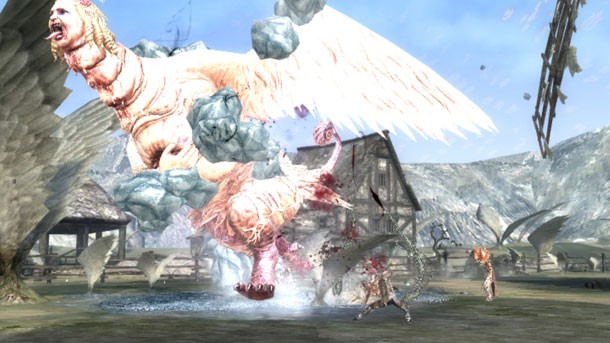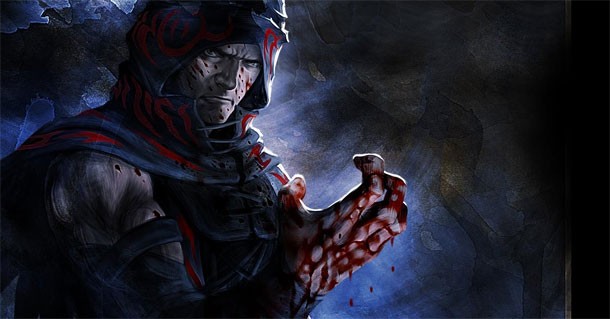Gear up for the holidays with Game Informer. Subscribe today to receive our latest issue!
Inafune On Sacrifice, Japanese Gaming, And More

Keiji Inafune isn't one to mince words. The former Capcom creative lead made headlines a few years back after proclaiming that Japanese game development was dead. He's since left the company to work on a number of new projects, including the upcoming Vita game Soul Sacrifice. We sat down with him and discussed the game, as well as his thoughts on heroism, sacrifice, and, oddly enough, Wonderbook.
What can you tell us about Soul Sacrifice, for the benefit of people who haven’t been following the game?
The concept of the game, as you can probably tell from the title, is about sacrificing, and it’s about always having to make choices. You have to give something in order to get something. I’ve always wanted to do a dark fantasy title, so that’s how it all started.
Some of those sacrifices include losing your health for some of the attacks and even giving up your life in combat. How do those systems work?
You can go to those extremes, but generally in the game the system is that you have to always give something in order to get more power. Because the main character is a sorcerer in the game, you always need to exchange something to use magic. When you’re fighting simple enemies, you can find things in the environments that you can give as an offering to get those magical powers. There will be times when you encounter really tough monsters or enemies that you have to defeat. At that time, you’re forced to make choices of giving something up in order to get greater power. In those cases you would give your flesh or your eyeball or your body part — and eventually your whole life. I wanted to illustrate that that happens in life also, and there comes a time when you have to give up all of your money or your house or other big things in order to get something in return. The theme comes from my life, and it’s something I wanted to include in the game.
An obvious sacrifice would be leaving Capcom, right?
Yes, obviously that’s been an influence and inspiration for the game. Leaving Capcom was a big decision, and while I wouldn’t say it was a sacrifice, it was something that I didn’t give up easily. I’d been with the company for 23 years, and it was a tough decision to make. But I thought I would gain something greater by doing what I did. Working with SCE is definitely something I couldn’t have done, because it’s a first party. That’s something that I gained in return.
Now that there’s been a bit of distance since your departure, has leaving Capcom been a liberating experience for you?
It has been liberating in a sense. It’s been challenging, of course, but it was definitely worth it. In terms of creative freedom, I did have a bit of liberty and freedom at Capcom since I led that whole group, but it was based on Capcom’s decisions. I had to play along with their decisions. In a very real sense I can decide what to do and what to create in new ways now.
In Dead Rising, the clock was always ticking. In Lost Planet, you were always getting colder. Superficially, it seems as though you’ve gravitated toward games where forces far greater than your character are conspiring against you. Is that a coincidence, or is there something about that concept that appeals to you?
You’re probably right about those themes. I personally like to see games where a man is able to fight back in an extreme state. That’s kind of my image of a hero. Every time I create a game, I have to place a hero in the story, and because I like that kind of a hero who can really fight against those intense circumstances. That’s probably why.
Superficially at least, it seems as though there’s some commonality between this game and Monster Hunter. Would you say that’s a fair observation?
If you look at it, like you said, superficially, that’s a fair assessment. I feel that Monster Hunter is a great game, and I wanted to extract the series’ strengths and adopt some of them. When you play the game, you’ll quickly realize that the gameplay and systems are totally different. You’ll notice the same level of quality that you’ve seen in the Monster Hunter series, but they’re completely different.
So there’s no barbecued meat in Soul Sacrifice?
In our game, we might grill something else — something that might give us ratings issues. [laughs]
One of the people I work with has a Monster Hunter save with more than 900 hours on it. Is she insane?
In Japan, it’s not hard to find people like her. If you call her insane, it’s like calling all of those Japanese people insane, too. [laughs]

Why did you choose to develop this for the Vita?
I wanted to create a multiplayer game, and I also wanted to appeal to a wide variety of players. If you think about the Japanese audience, as you can see with the popularity of Monster Hunter, they’re more comfortable playing ad hoc multiplayer. That’s opposed to the western audience, which goes online easily. I chose Vita in order to capture both audiences, regardless of their multiplayer preferences. Because this is a new IP, I wanted to take on the challenge of a new platform, because that’s something I always like to do.
Are you able to do things with the Vita hardware that you wouldn’t have otherwise been able to do?
It’s a Vita title, so of course we’re going to include a lot of the hardware features. At the same time, we don’t want to rely on gimmicks; it’s more important that players enjoy the game itself and not just the technical features. We’re exploring a lot of different things that feel comfortable, but we can’t go into details yet because we’re still experimenting.
In multiplayer, are all of the playable characters sorcerers?
Yes.
What kinds of mythologies did you draw from when making the game? Eastern? Western? Both? Neither?
When I’m creating a story and art, I’m always thinking about putting in the best parts of Japanese games — because I am Japanese — and you probably know that I’m also an outspoken advocate for appealing to the rest of the world. I really believe that doing a great hybrid makes something even greater. I tell my staff that they should draw influences from the western styles while also pulling inspiration from eastern games. As for myself, I lean a little bit more toward the western side.
Did you recommend that your team check out any particular movies or books before starting work on Soul Sacrifice?
One of the reasons we chose the fantasy theme is because it’s naturally western. When I went to my team and said we’re going to do a fantasy, a lot of Japanese people are familiar with fantasy worlds; they’ve seen movies like Lord of the Rings, which makes it a pretty easy start. Back in the day, many Japanese people weren’t familiar with zombie culture, so I had to force them to watch zombie movies. With this, it wasn’t that challenging.
Do you feel like a zombie pioneer?
I’ve always loved zombies, and I started [working on zombie games] before anyone else did. I feel like I got there first.
Are there any contemporary games or concepts that you’ve found interesting?
This has nothing to do with my relationship with Sony, but I’m really interested in Wonderbook. It’s something I see a lot of potential in, and I’d like to try creating something on it, if given a chance. It could be appealing to a lot of different people.
There’s something really interesting about augmented reality and being able to pull in elements from the real world and incorporate them into games.
As a creator, I’d like to create something for younger audiences, because for them reality and imagination can still mix easily. That would be a good challenge.
It’s difficult for me to find games that my kids can play and watch that are still interesting for me. Most of your games skew toward older audiences, but I can see how you’d love to make something that would appeal for younger players as well.
I imagine though although I did say that, if I were to create something for the Wonderbook, it would be something like a ghost in the closet or something spooky. [laughs]
I’d bet that most hardcore gamers, when your name comes up, would say you’re the father of Mega Man and the guy who said that Japan was dead. If you could add one more thing to that list that you’d like associated with your name, what would it be?
It doesn’t apply to the current situation, but in the future I would like to be known as the guy who saved the Japanese game. I hope that makes the headline! It would be nice if that has a next chapter.

Get the Game Informer Print Edition!
Explore your favorite games in premium print format, delivered to your door.
- 10 issues per year
- Only $4.80 per issue
- Full digital magazine archive access
- Since 1991









